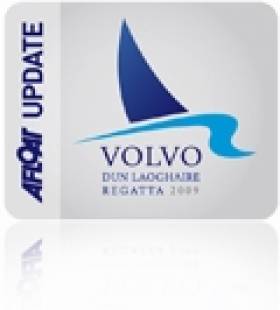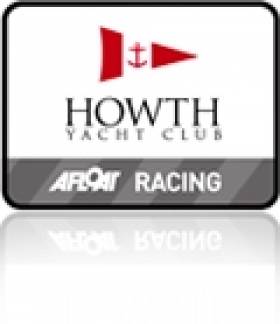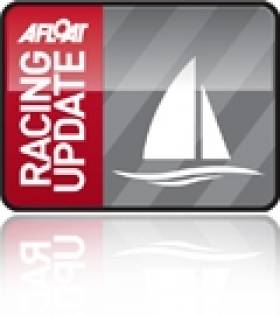Displaying items by tag: J80s
The Royal Irish Yacht Club hosted four-class Dun Laoghaire Cup for sports boats with racing for 1720, SB20, J80 and Beneteau First 21 classes got off to a slow start on Saturday due to unstable winds on Dublin Bay.
In a fine turnout of nearly 50 boats, just one race was possible in each class with RIYC Sailing Manager Mark McGibney telling Afloat: "Fickle and unstable wind direction led to a very frustrating day for the race management team".
The 1720 East Coast Championship, the J80 East Coast Championship and First 21 National Championship are all being staged as part of the Cup.
For the SB20s, in an 11-boat fleet, it is the first opportunity to 'cross swords' in what promises to be a very exciting season in the build-up to September's class World Championships being staged at the same venue. Michael O'Connor leads from Niall O'Riordan. Tadhg Donnelly is third.
In the 21-boat 1720 class, Howth's Robert Dix leads from Rory Lynch. Third is Robert O'Connell.
The 11-boat B21s who are racing under both scratch and ECHO are led (on scratch) by Peter Carroll with Jimmy Fischer second and Hugh Kelly third.
In a five boat J80 fleet, 1 GBR 605 Vincent Lattimore leads Declan Curtin. Royal St George's Mark Nolan lies third.
Racing continues on Sunday with the prospect of more breeze. Results are here
As regular readers of Afloat will know, Ireland's only dedicated sportsboat regatta was postponed in 2021 due to COVID.
The J80 National Championships returns this autumn to Howth Yacht Club.
A fleet of 14 boats contested the 2020 Championships at Dun Laoghaire with Howth's Pat O'Neill emerging as Irish Champion.
Previously the fledgeling championships sailed at Howth in 2019 and 2018 as part of the club's Wave Regatta.
This October 2/3, O'Neill can expect competition not only from his own HYC Club Mates Dan O'Grady and Robert Dix but also 2020 runner up Jonny O'Dowd of the Royal St. George Yacht Club.
There was a Wicklow tint to the O'Neill winning team with Shane Hughes, Aaron Jones and Conor Cleary all active Greystones SC members teaming up with former Class President O'Neill for the 2020 challenge.
The Irish J/80 Class Association is a relatively new class and formed in 2017 to represent owners, sailors, associated clubs and to help develop J/80 racing here.
Post-DL Regatta Event for Ultimate Bragging Rights
Competitors in this year's Volvo Dun Laoghaire Regatta are set to race for the ultimate bragging rights in a new bonus event.
The Royal Irish Yacht Club is proposing the one-day event on Sunday 31 July modelled on the ISA All Ireland Sailing Championship, where up to 16 teams will compete in a winner-takes-all contest with the prize of a significant voucher to go against their annual Dublin Bay Sailing Club subscription.
The best helms from Cruisers 1, 2 and 3, White Sails, Sigmas, Dragons, 31.7s and SB3s will compete using the symmetrical kite J80s in a round-robin fleet racing format.
Each participating DBSC class will have one team, selected by being the highest ranked DBSC boat in the Dun Laoghaire Regatta. Each class can decide if the team is chosen on a design, IRC or ECHO basis.
More details will be available in due course from the RIYC website.
Dun Laoghaire Women on the Water Day in July
The National Yacht Club in partnership with the ISA would like to invite women of all ages and all levels of sailing and other water sports to come sailing on Sunday 11th July from 13.00 - 17.00 hrs.
This is a great opportunity to join fellow female sailors for an enjoyable afternoon of sailing in the ISA's fleet of eight J80s, beautiful 8 metre long one-design racing sailboats. We hope to get as many women as possible out sailing on 11th July, followed by a few drinks up in the bar afterwards.
Each J80 will have 4 or 5 crew on board of whom 2 will be experienced crew who will explain all to those guests on board. Lifejackets or buoyancy aids will be supplied and are mandatory for all participants on the water.
If you are keen to join us and sail in the J80s on Sunday 11th, please contact Pamela Smithwick at [email protected] or Cathy Mac Aleavey on 0879480801.
Junior Race Training in HYC on J80s
Sixty-four of Howth Yacht Club's junior sailors were treated to an evening of race training in the ISA Sailfleet J80s on a fresh Monday evening, under the guidance of Laura Dillon.
A host of support vessels and RIBs facilitated the running of the evening which saw all the children (ranging in age from 9 to 15) taking part in two short windward-leeward 'races' with two senior volunteers on each of the eight J80s.
The moderate southerly wind facilitated exciting conditions in the flat waters of Howth Sound and gave many of the children their first taste of one-design keelboat racing. More than thirty-five volunteers escorted the exhilarated sailors back to the club after their experience.
RSGYC take on Cumberland Cup
A Royal St George YC team will be the sole Irish representatives at the Royal Thames YC Cumberland Cup, the oldest perpetual trophy in yacht racing, with racing kicking off today at Queen Mary SC. The event is a two-boat team racing event sailed in J80s with the home team, Royal Thames, the current holders. The RSGYC team, headed up by John Sheehy and Nick Smyth, will face off against teams from Australia, Monaco, Germany, Australia, New Zealand and the USA. The Cumberland Cup dates back to 1775 and was established some 76 years before the America’s Cup
Two-boat team racing is best known in Ireland through the 'random pairs' format, where the team with a boat in last place loses the race. The result is highly tactical and combative, aggressive sailing, with the final beat to the finish line becoming particularly frantic.
Sheehy and Smyth come off a weekend that saw the pair finish in the last eight at the presitigous Wilson Team Racing Trophy in West Kirby SC, and Sheehy is also Ireland's top-ranked match racer at present.
Racing kicks off this morning, and you can catch some glimps of the action on the reservoir on their website's live webcam.
































































